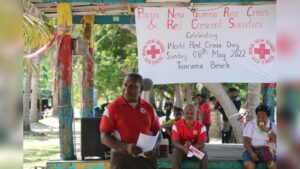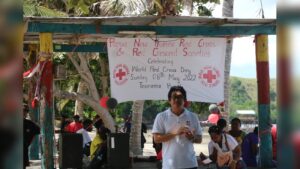Today, the PNG Red Cross Society (PNGRCS) is celebrating World Red Cross and Red Crescent Day, a day dedicated to recognizing the support given by Red Cross/Red Crescent staff and volunteers to some of the world’s most vulnerable people.
From global war zones to the most remote parts of PNG, volunteers are working to protect local communities, helping them to rebuild and recover from the destructive impact of natural disasters, conflict and violence.
Specific challenges for PNG include tribal fighting in which housing, school and health facilities are frequently destroyed, and families are forced to flee their homes.
This country is also prone to natural disasters such as earthquakes and, like other developing countries, has a health system struggling to cope with the effects of the COVID-19 pandemic.
Red Cross staff and volunteers have been actively engaged in providing aid and assistance to mitigate the worst of these threats, which frequently afflict the most vulnerable in society.
PNG Red Cross Society (PNGRCS) Interim General Secretary Newton Kiafuli said “PNGRCS strives to save the lives of people in PNG through support for healthcare, and the prevention of disease. It offers help and support for people to rebuild their communities, always focusing on humanitarian priorities and looking out for the most vulnerable in society such as people who have to flee from violence, women, children and the elderly. “

The International Federation of the Red Cross and Red Crescent Societies (IFRC) National Society Development Manager, Dino Argianto said “The coming together of individual societies in the International Federation means resources can be mobilized to where there is greatest need.”
“Since early 2020, the IFRC has been delighted to be able to fund the PNG Red Cross Society work, raising awareness and increasing prevention against COVID 19.”

The International Committee of the Red Cross (ICRC) Head of Mission Dominik Urban added that along with other activities carried out, the ICRC has been supporting PNG’s uniformed forces in preparation for the looming general elections.
“The ICRC has expertise in providing training for disciplinary forces to operate according to international best practice, aiming at minimizing violence and protecting human rights,” Mr Urban said.
Globally, the Red Cross movement consists of a network of 80 million staff and volunteers and represents the largest humanitarian network worldwide. It is active in nearly every country around the world.
The movement remains strictly independent, neutral and impartial and so has unique access to work in some of the most dangerous and difficult places, always focused on helping those most in need.

